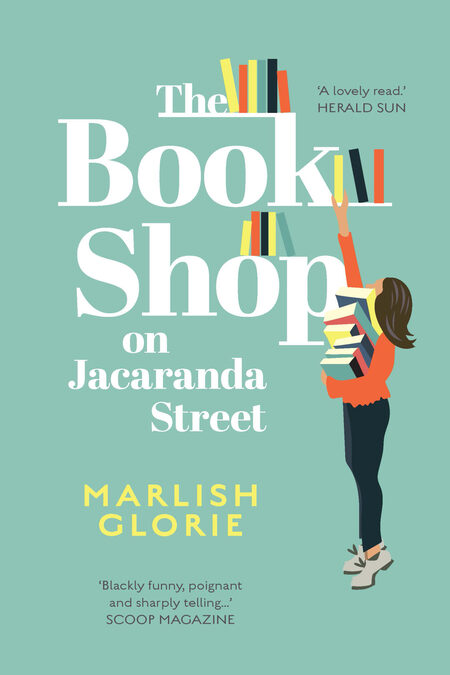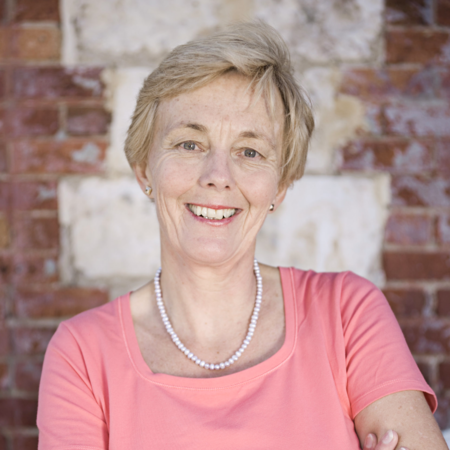(courtesy Fremantle Press)
There are times in our lives, many times in our lives in fact, when waving a magic wand to make trenchant issues simply disappear is a very appealing option.
Unfortunately outside of Harry Potter films, wands are not in general, everyday use and problems usually have to be solved the old-fashioned way by facing them head on and hoping to hell you can figure out a way to get through the other side.
But as Helen Budd-Doyle, the lead character in Marlish Glorie’s deceptively dark and emotionally honest novel, The Bookshop on Jacaranda Street discovers – deceptive only because the backcover blurb and cover may lead you to believe this is a warmhearted story of bookshop-driven reinvention, and while it’s definitely that, it’s by no means the whole, captivatingly complex story – tackling your problems, even when you’re of a mind to do so, isn’t the easiest thing in the world.
Trapped in a marriage riddled with grief and its corrosive consequences, Helen finally has no choice but to walk out, her ultimatums for change, driven by two decades of she and her husband sublimating their responses to unimaginable past loss in ways that drove them apart, finally being exposed as nothing more than delaying tactics on her part.
At first, Helen finally lost and uncertain, which makes perfect sense; how do you walk out of a marriage that once promised the world and was your world, and remake yourself at a point in your life where you’re supposed to be kicking back and relaxing after successfully raising two sons?
Two hours later Helen was living in Astrid’s house. She had managed it, even though demented with exhaustion. With Astrid’s help, she had packed her car with clothes and books, driven to the next driveway, unpacked and carried her belongings into the guest room where she now lay drowsily between the sheets of a freshly made bed. Falling into a deep sleep the last thought that occurred to her was that she’d married for worse. For better has been left behind at the altar.
Helen’s not entirely certain – and about those two sons (Vivian and Gabriel), neither of whom seems to know where he wants to head next either – what she should do instead of being a wife to Arnold, a man who has filled their house and yard with so much junk they should be one of those hoarding reality TV shows.
In the absence of any and all wands, Helen has no choice but to find something, anything to fill her life, and with the help of her close fiend and neighbour, and surrogate mother Astrid (who’s not exactly blissfully happy with her retired minister husband) she decides, pretty much on a whim to buy a rundown second hand bookshop from a drunk guy called Jim.
Yep, sounds totally and completely legit, but desperate times and all that, and plunges into restoring the bookstore to something approaching its former glory; to be fair, it’s not clear it actually ever had any glory but suffice to say, it is renovated, restored, cleaned up, and reimagined, its shelves arranged in a maze and stocked with 5000 books bought from a low-rent book wholesaler called Razoo who, rather remarkably, ends up becoming Helen’s friend.
It’s a remarkable development because Helen, initially at least, is a book snob and hates the idea of selling pulpy crime and sci-fi novels, thinking them too low in the genre hierarchy to be worth her while.
(courtesy Fremantle Press)
But, and that’s just one of the may salient commentaries on book selling and publishing tucked away in the inviting pages of The Bookshop on Jacaranda Street, it turns out her customers, from harried mums to friendly students love genre literature and Helen’s desperate grab for relevance and purpose turns out to be just what her local area needs.
Colour her surprised, but it’s not just here that changes are taking place.
The novel actually concentrates most of its time on the found family that agglomerates around Helen and the bookstore, from Razoo and his sudden discovery of friendship and connection to the two women who end up reshaping the lives of Vivian and Gabriel, who themselves end up finding more purpose in literary retailing than either of them likely ever expected.
Their paths to some sort of healing, and indeed that of all the characters in the book, are neither straightforward nor easy, and while you might suspect the book is going to be all light and fluffy problems easily solved by chats around books, the reality is that no one really has an easy time of it and any resultant happiness, and yes, of course, there is plenty of that, is hard-earned and well and truly woven into the fabric of their souls.
No magic wand waving here and each and every one of the characters, Helen most particularly, has to work hard for their happy endings, all of which arrive at the end of the kind of existential mazes after which the bookshop’s shelves are patterned. (Well, not exactly but it feels like that at times.)
Stepping outside into the autumn air with its familiar whiff of winter, the promise of rain not far away, Helen felt a sense of things turning. She stood on the pavement and looked up. Clouds were juggling themselves into a pattern as they moved across the sky. Indecisive.
What makes The Bookshop on Jacaranda Street so beautifully readable is that al the warmheartedness and joy in the novel is not simply thrown like pixie dust on the characters.
In the course of having to work their way through the minefield of poor decisions, past traumas and messily arrived-at expectations, they come to appreciate that what they end up with is something truly worth holding onto.
It may not even remotely resemble what they thought their lives would be, and it’s safe to say that from Helen on down that sound you hear are once dearly-held hopes and dreams crashing to the ground, but it’s good and its earned and its worth every twist and turn in the chaotic journeys they undertake.
That all of these journeys take place in and around a revitalised bookshop that quickly becomes an unofficial hub of the community is just a magical bonus, lending The Bookshop on Jacaranda Street a quirkily transformative air against which a lot of real life stuff goes down.
Rich with characters who feel lived-in and emotionally honest, and problems that don’t simply vanish because shelves are varnished and books are artfully arranged, The Bookshop on Jacaranda Street is a lovely and affecting piece of writing that knows full well that life’s problems can’t just be spelled away and that if the life that results in their wake is to mean anything, and it does in the closing chapters to a warmhearted degree, it must be worked through and lived through so you come out the other end really valuing what it is you have wrought.

